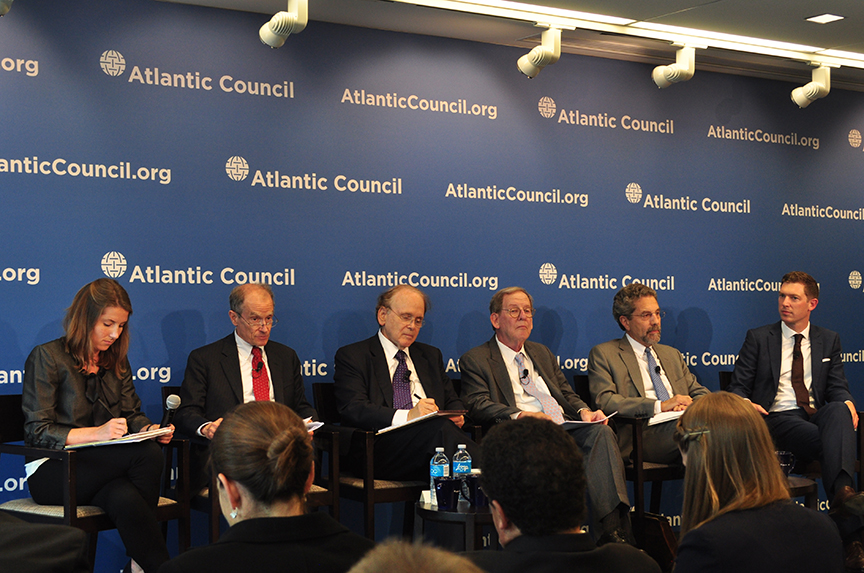 On Wednesday, July 19, the Atlantic Council’s Global Energy Center hosted Daniel Yergin, Ambassador Richard Morningstar, Ambassador Daniel Fried, Jeffrey Turner, and David Mortlock for a discussion about the Russia sanctions bill making its way through Congress. The discussion was moderated by Global Energy Center Associate Director Ellen Scholl.
On Wednesday, July 19, the Atlantic Council’s Global Energy Center hosted Daniel Yergin, Ambassador Richard Morningstar, Ambassador Daniel Fried, Jeffrey Turner, and David Mortlock for a discussion about the Russia sanctions bill making its way through Congress. The discussion was moderated by Global Energy Center Associate Director Ellen Scholl.
The event opened with remarks from Vice Chairman of IHS Markit Daniel Yergin, who also joined the panel discussion, which covered European concerns, the intent of the bill, Office of Foreign Asset Control licensing authority, Congress’ ability to make changes to the bill, precedent for carve-outs, Nord Stream 2, Russia’s potential reaction to the bill, what part of the US government will manage the sanctions, and potential fixes for the bill.
In particular, Yergin and the his fellow panelists underscored the bill’s potential to inadvertently benefit Russia and the problems the bill as written could pose for energy operations
Ambassador Fried, a distinguished fellow at the Atlantic Council, expanded on the differences between the sanctions currently in existence and the sanctions under consideration. In response to a question about the status of the bill, Squire Patton Boggs’ Jeffrey Turner remarked on the path the bill has taken thus far and mapped out the most probable future for the bill in both Congress and the White House. When asked about potential issues with the bill, Ambassador Morningstar, the founding director and chairman of the Global Energy Center at the Atlantic Council, highlighted the danger in the bill’s broad scope, the ways in which Russia could use the bill in its current form to sabotage competitive gas projects, its potential negative effects on Europe’s energy security, the need for carve-outs in the bill, and the dangers of unilateral actions on sanctions. David Mortlock, a senior fellow in the Global Energy Center at the Atlantic Council, clarified the components of the bill’s energy-specific provisions and explained how companies are reacting to the bill in its current form.
Overall, the panel agreed that the intention of the bill is good and that, with specific improvements, the bill could be an effective reaction to both Russia’s invasion of Ukraine and its meddling in the US election.
Image: From left: Ellen Scholl, associate director of the Atlantic Council’s Global Energy Center, moderated a panel discussion on sanctions on Russia with Daniel Fried, a distinguished fellow at the Atlantic Council and the State Department’s coordinator for sanctions policy in the Obama administration; Daniel Yergin, an energy expert and vice chairman of IHS Markit; Richard L. Morningstar, founding director and chairman of the Atlantic Council’s Global Energy Center; Jeffrey Turner, managing partner in the public policy practice at Squire Patton Boggs; and David Mortlock, a nonresident senior fellow in the Atlantic Council’s Global Energy Center, in Washington on July 19. (Atlantic Council)
